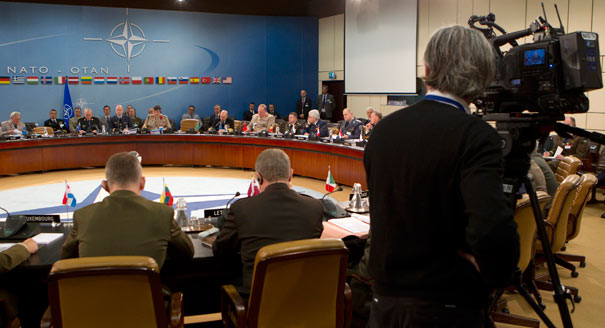Every week a selection of leading experts answer a new question from Judy Dempsey on the foreign and security policy challenges shaping Europe’s role in the world.
Ian BondDirector of foreign policy at the Center for European Reform
NATO can do little to end the Ukraine crisis; but by doing nothing, it could make the consequences much worse.
The leaders of NATO countries, including U.S. President Barack Obama, made a big mistake by ruling out any alliance-led military effort in defense of Ukraine. At the start of the crisis, the upper house of the Russian parliament, the Federation Council, authorized President Vladimir Putin to deploy forces on Ukrainian territory. At that stage, a clear statement that NATO would not stand by while the territorial integrity of one of its neighbors was violated could have had an important deterrent effect, creating uncertainty in the Kremlin about the implications of invasion. Instead, Russia knew that it could occupy Crimea without the risk of a military confrontation with NATO.
With “Putin’s Martians,” who are clearly covert Russian forces, active in Eastern Ukraine, it is now too late for deterrence. The question is whether the Ukrainians will defend their territory; and if they do, whether NATO will help them or merely watch them go down to inevitable defeat at the hands of Russia. Europe’s security landscape will be immeasurably more dangerous if NATO does nothing to prevent the dismemberment of a country of 45 million people that shares borders with four NATO allies.
Constanze StelzenmüllerSenior transatlantic fellow at the German Marshall Fund of the United States
The crisis in Ukraine is a watershed moment for Europe, with a newly resurgent Russia testing Western resolve. It is key for the EU and the United States to maintain unity, patience, and nerves. The thorniest question is how to counter Russia without contributing to an escalation of the conflict (or giving Russia an excuse to provoke such an escalation), and what role NATO should have in that task.
The alliance must do four things. Some are already happening; others are future options. The first is deterrence. That is difficult given the state of European militaries and recent withdrawals of U.S. forces from Europe. This makes political clarity and tough sanctions all the more important.
The second is reassurance. NATO’s easternmost member states, the Baltics and Poland in particular, need guarantees that the alliance will do what it takes to preserve their security. Visits by top Western policymakers, ramping up air defenses, and undertaking military exercises are all important. Stationing ground troops in these countries is currently ruled out by a Western agreement with Russia—but this arrangement could be forfeited if Russian aggression in Ukraine continues.
The third is support for those states that seek closer association with the West: Ukraine, Georgia, and Moldova. Offering training and assisting with military exercises are useful and should be done; providing weapons is not—for now.
NATO’s fourth option is to extend an offer of membership. That is not feasible for Ukraine at the moment. But if Russia intervenes in Ukraine beyond Crimea or in Moldova’s breakaway region of Transnistria, the alliance might offer a membership perspective to Georgia and Moldova.






